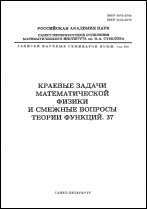|
|
Zapiski Nauchnykh Seminarov POMI, 2002, Volume 284, Pages 36–47
(Mi znsl1536)
|
 |
|
 |
This article is cited in 8 scientific papers (total in 8 papers)
Determinantal inequalities for accretive-dissipative matrices
Kh. D. Ikramov
M. V. Lomonosov Moscow State University
Abstract:
A matrix $A\in M_n(\mathbf C)$ is said to be accretive-dissipative if in its Hermitian decomposition
$$
A=B+iC, \quad B=B^*, \quad C=C^*,
$$
both matrices $B$ and $C$ are positive definite. Further, if $B=I_n$, then $A$ is called a Buckley matrix. The following extension of the classical Fischer inequality for Hermtian positive-definite matrices is proved.
Let
\begin{math}
A=\begin{pmatrix} A_{11}&A_{12} A_{21}&A_{22} \end{pmatrix}
\end{math}
be an accritive-dissipative matrix, $k$ and $l$ be the orders of $A_{11}$ and $A_{22}$, respectively, and let $m=\min\{k,l\}$. Then
$$
|{\det A}|\le3^m|{\det A_{11}}|\,|{\det A_{22}}|.
$$
For Buckley matrices, the stronger bound
$$
|{\det}|\le\biggl(\frac{1+\sqrt{17}}4\biggr)^m|{\det A_{11}}|\,|{\det A_{22}}|.
$$
is obtained.
Received: 14.02.2002
Citation:
Kh. D. Ikramov, “Determinantal inequalities for accretive-dissipative matrices”, Computational methods and algorithms. Part XV, Zap. Nauchn. Sem. POMI, 284, POMI, St. Petersburg, 2002, 36–47; J. Math. Sci. (N. Y.), 121:4 (2004), 2458–2464
Linking options:
https://www.mathnet.ru/eng/znsl1536 https://www.mathnet.ru/eng/znsl/v284/p36
|

| Statistics & downloads: |
| Abstract page: | 283 | | Full-text PDF : | 95 |
|




 Contact us:
Contact us: Terms of Use
Terms of Use
 Registration to the website
Registration to the website Logotypes
Logotypes








 Citation in format
Citation in format 
